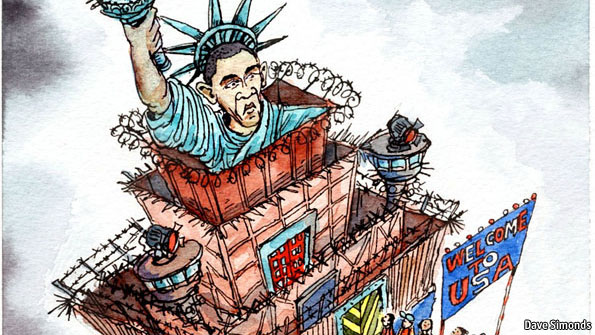How much has Obama preserved America's connectivity?
 Thursday, June 17, 2010 at 1:21AM
Thursday, June 17, 2010 at 1:21AM 
Last piece by outgoing Lexington at The Economist.
In it, Lex provides summarizing judgment on Obama's success to date in keeping America an open and connected society/economy.
The record is decidedly mixed: no progress on an immigration bill combined with politically-insipid shows of military force along the border (the 1,200 guardsmen just sent); no great trade barriers but also no serious efforts to move free trade pacts on the books (Colombia, South Korea). A Cato expert is quoted as saying the Obama administration seems to view trade policy as a way to advance environmental and social goals and nothing more. Our border bureaucracy is described as the worst in the advanced world (I guess I would agree).
Larger downstream argument advanced: US military dominance is waning in the sense that we can no longer play Leviathan to everyone and assume all the SysAdmin jobs that result. Suggestion is that we need to recalibrate alliances to account for rising great powers.
Good news is that US soft-power exports remain world-class.
China is contrasted: one-fifth of college grads say they want to emigrate, but few peasants do.
Piece ends with call for Obama to stand up more for openness.
Kind of a sad finale for this Lexington. He doesn't seem to be finding much improvement on this score from Obama.
I think we're going to see a lot more such arguments from big-thinking types regarding the importance of America standing up for its cherished ideals. Obama's too-lawyerly approach does not inspire like his speeches, and the gap is becoming noticeable.
 Obama Administration,
Obama Administration,  US,
US,  global economy,
global economy,  immigration | in
immigration | in  Citation Post |
Citation Post |  Email Article |
Email Article |  Permalink |
Permalink |  Print Article
Print Article 









Reader Comments (4)
Talks cheap (even when it sounds good) . . Action is a lot harder to enact.
This administration is all about the above . .
So...we get to be the first nation to "choose" it's decline? Not going to rot from within like Rome, wear down from war like England or simply wander into oblivion like Spain?
Or...is there another way to be number one besides having the deadliest military ever seen. I hope there is. Personally, I am getting very uncomfortable with the amount of money spent on exotic hardware, planes, ships, tanks and "stuff" that simply does not seem to bring us a return on our investment.
How about becoming number one in medical research? Energy...? OK, I'll pass on energy right now.
I hate to think of us as "quitters." We have a lot to be proud of. The Marshall Plan, the Moon Landing, Civil rights. We seem to be in a rut right now.
I'm not sure I see why the moon landing is always held up as one of America's great accomplishments. I suspect that future historians will look at it as one of the most bizarre, inexplicable events in history. It was an extraordinarily difficult, risky and expensive stunt, but not really anything more than that; pretty much the equivalent of Phillipe Petit tightrope walking between the Twin Towers, but on a much grander scale. 41 years later, we can confidently say that there were absolutely no tangible benefits derived from the moon landings. We're not going back in the foreseeable future, certainly not before we have technological advances in space travel that would make such a trip more practical and capable of yielding concrete benefits. It was really just a pointless by-product of Cold War madness, much like the Vietnam War.
Stuart Abrams wrote: "41 years later, we can confidently say that there were absolutely no tangible benefits derived from the moon landings." unquote
Sir, with all due respect, without the challenges offered up by the "Space Race to the Moon" Humanity would not enjoy the technology we see today . . Perhaps all the things we use and enjoy today would still have come along, but nowhere as soon.
And as for your mention of the Viet Nam war, even there, was an upside for Humanity. Again, the acellerated challenges presented to Trauma Medicine has given us insights not only to Trauma treatment but other medical fields as well . . Soldiers in Iraq and Afghanistan are treated and recover from wounds today that would have been absolutely fatal before that war . . as do civilians who are injured in traumatic accidents daily . .